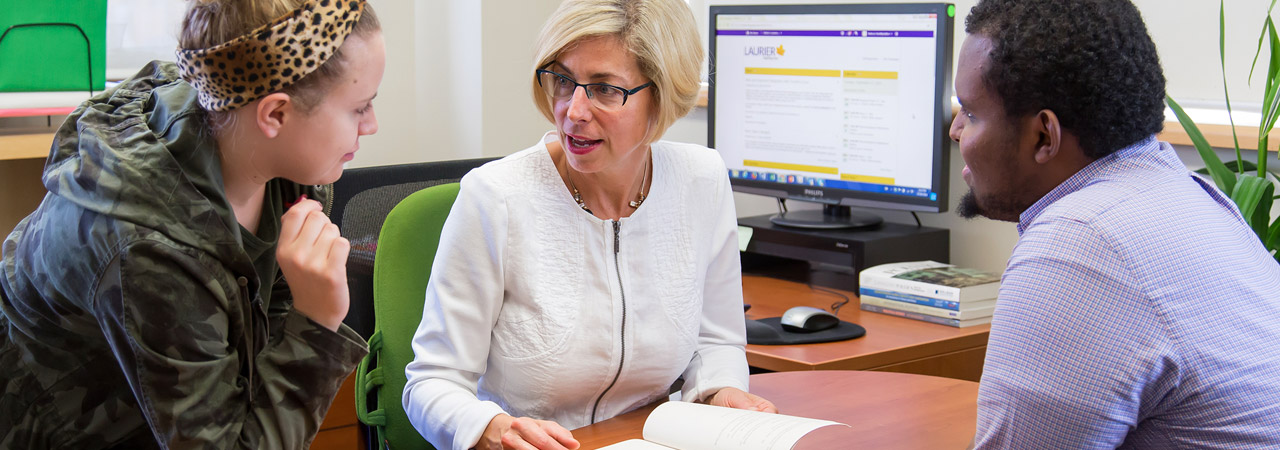
Photography by Tomasz Adamski
Whether it be studying how Syrian refugees are integrated on the ground in Turkey, tackling the issue of poverty in Uganda or considering political questions closer to home, research undertaken in Laurier's Department of Political Science makes an impact.
It's a proud tradition that has its origin in the 1920s, when the teaching of political science began at Wilfrid Laurier University's precursor, what was then known as the Waterloo College of Arts.
"Over the years, our department has become well-known and well-respected throughout Canada for its research and outstanding student experience," says Debora VanNijnatten, current chair of Laurier's Department of Political Science.
Politics remained an important course of study when Waterloo College became Waterloo Lutheran University in 1960. That importance was made clear when the Department of Political Science became an independent entity in 1967, six years before Wilfrid Laurier University was born as a public university out of Waterloo Lutheran.
From the beginning, the department – which is celebrating its 50th anniversary this academic year with a series of special events – established itself as a strong teaching and research body, becoming well-known for its focus on Canadian government and policy, international relations, political thought, comparative politics and quantitative research methods.
Those original core strengths remain strengths of Laurier's political science department today, VanNijnatten says during an interview in her Waterloo office. There has also been significant change during recent years, with the department and its 19 faculty members putting a focus on finding new ways for students to apply their knowledge by offering courses with an applied learning or community service learning component.
"The biggest changes we've ever made to our program have happened in the past four or five years," VanNijnatten says.
As part of recent changes, the department revamped its graduate program to reflect an emphasis on applied learning, giving it a new name: Master of Applied Politics. In the undergraduate field of study, students can concentrate in international governance and global trade, Canadian politics, comparative politics, public policy, area studies or political research methodology.
Laurier's Department of Political Science has also become increasingly engaged in interdisciplinary programming, finding complimentary areas of study with other departments in the Faculty of Arts. Two years ago, the department began a merger with North American Studies, which was a standalone program at Laurier from 2007 until 2014. Another recent change saw the introduction of a unique six-year program by which students can earn a Bachelor of Arts in Political Science from Laurier as well as a law degree from the University of Sussex in the United Kingdom.
Among the department’s greatest strengths, VanNijnatten says, is its expertise in public opinion and electoral behaviour.
The Laurier Institute for the Study of Public Opinion and Policy – an independent research centre under the Laurier Political Science umbrella – maintains a close connection with Ipsos polling firm and provides respected analysis of public opinion and voter intent. Darrell Bricker, chief executive officer at Ipsos, is a Laurier graduate.
"Laurier is very strong when it comes to public opinion research and analysis," VanNijnatten says. "There are very few places you can do this kind of public opinion research and training. It's unique when it comes to universities in Canada."
The Department of Political Science also shares a close working relationship with the Laurier-affiliated Balsillie School of International Affairs.
As part of providing students with practical knowledge, the department in 2015 hired its first practitioner-in-residence, former Ontario cabinet minister John Milloy. Throughout the academic year, the practitioner-in-residence offers a series of workshops on political topics such as how to brief a government minister, survive a scrum with reporters or conduct government relations. The practitioner-in-residence also delivers public lectures and one-on-one mentoring to students.
A series of events throughout 2016 and 2017 are designed to mark the 50th anniversary of the department. During Homecoming celebrations in September, Barry Kay – who joined the department in 1978 – presented a "Legends of Laurier" lecture about the U.S. election. In addition, a bus trip to Laurier's Brantford campus and the former Mohawk Institute Residential School shed light on a dark chapter in Canadian history.
The department is also planning networking socials, a book sale, movie night, dinner and guest speakers to mark its 50th anniversary.
"In all of these events, we hope to connect current students with alumni and strengthen ties all the way around," said Sherry Palmer, a senior administrative assistant who's worked in Laurier's Department of Political Science for 26 years.
To leave a lasting legacy of the anniversary, an alumni legacy fund has been created that will serve to enhance student experiences through providing experiential learning opportunities.